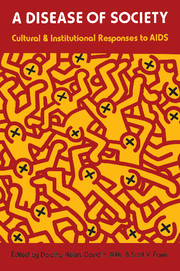Book contents
- Frontmatter
- Contents
- Acknowledgments
- Introduction: A Disease of Society: Cultural and Institutional Responses to AIDS
- PART I CULTURAL IMAGES
- PART II SYSTEMS OF SOCIALIZATION AND CONTROL
- PART III SYSTEMS OF CARING
- PART IV RIGHTS AND RECIPROCITIES
- AIDS and the Future of Reproductive Freedom
- The Poisoned Gift: AIDS and Blood
- AIDS and the Rights of the Individual: Toward a More Sophisticated Understanding of Discrimination
- Notes on Contributors
- Index
The Poisoned Gift: AIDS and Blood
Published online by Cambridge University Press: 20 May 2010
- Frontmatter
- Contents
- Acknowledgments
- Introduction: A Disease of Society: Cultural and Institutional Responses to AIDS
- PART I CULTURAL IMAGES
- PART II SYSTEMS OF SOCIALIZATION AND CONTROL
- PART III SYSTEMS OF CARING
- PART IV RIGHTS AND RECIPROCITIES
- AIDS and the Future of Reproductive Freedom
- The Poisoned Gift: AIDS and Blood
- AIDS and the Rights of the Individual: Toward a More Sophisticated Understanding of Discrimination
- Notes on Contributors
- Index
Summary
Dr. louise keating became “trash czar” for a few days. Dr. Keating, director of Red Cross Blood Services in Cleveland, found her center almost engulfed by mounds of debris — dressings, needles, plastic tubes — most of it the usual detritus of any organization, but some of it splashed with the blood of donors. Her center was not generating any more trash than usual. But suddenly no one was willing to cart it away. AIDS could be transmitted through blood, we had now learned. Last year's innocuous garbage had become this year's plague vector. Or so it seemed to Cleveland's carters. And the refuse piles grew.
Dr. Keating did solve her problem. Now, all waste that has any blood on it is sterilized in an autoclave until nothing, not even a virus, survives. But AIDS has created many other problems in the nation's blood supply: for those, like Dr. Keating and her colleagues, who must find donors and ensure that the blood obtained is safe; for those who give blood; and for those who receive it.
We live in a community that has chosen to provide for its members' needs for whole blood by a system of gifts. Donors receive no monetary compensation for their blood; recipients are charged for the costs of obtaining, testing, storing, and transporting the blood, but not a “supplier's” fee. In a culture that deems markets the proper means to produce and distribute goods and that celebrates self-interest as the wellspring of human action, gifts of blood may seem anomalous and mysterious.
- Type
- Chapter
- Information
- A Disease of SocietyCultural and Institutional Responses to AIDS, pp. 216 - 240Publisher: Cambridge University PressPrint publication year: 1991
- 2
- Cited by

